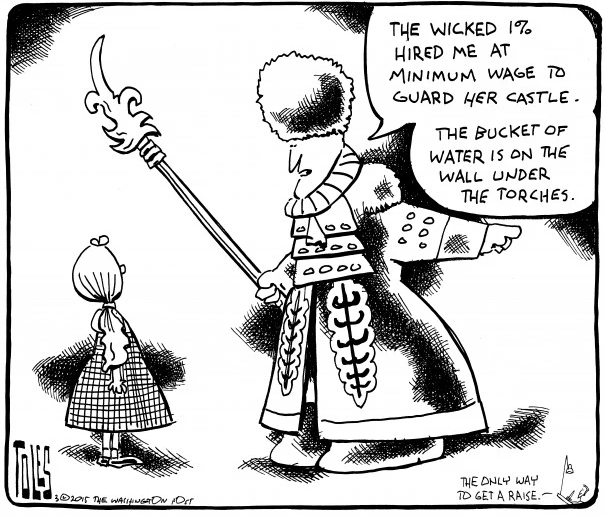
The old debate over minimum wage has made its way into the presidential campaign taking off in the United States. In fact, since the adoption of the very first law regarding minimum wage under the New Deal in 1938, despondent Republicans have never been shy in their disapproval. However, while they would never admit it, history shows that it is a key instrument in economic security and the fight against poverty.
The current movement in favor of raising the minimum wage was born in 2012 among the employees of fast food restaurant chains in New York, during the social uprising that was Occupy Wall Street. The movement called the “Fight for $15” campaign, supported by large unions, or at least those that remain, has since spread throughout the country among retail workers, day care centers, and airport employees. It’s had some success. Two weeks ago, following decisions made on a statewide scale in New York and in the cities of Washington, D.C. and Los Angeles, a few thousand entry-level employees, a large number of whom are evidently women, negotiated a gradual increase in their salary to just over $15 per hour; this is more than double the federal minimum wage of $7.25, which hasn’t increased for years. Other cities, such as Chicago, Seattle and San Francisco, have also announced increases in minimum wage.
The doubling of the legal minimum wage is remarkable, but also gives rise to controversy over its impact on the price of goods and the job market, a nail which the Republicans will not refrain from striking. This is especially evident as the debate touches a nerve in their anti-statism stance, in which it is logical that the rise in minimum wage be calculated from one region to another in accordance with the level of economic health of each area, and in which it is necessary to be careful not to unintentionally cause harm to the development of small and medium-sized businesses.
These small businesses are the breeding ground of the national economy, and the fact is that decades of research in the United States have shown that adjusting the minimum wage was not only essential to the economic survival of million Americans, but also that it was necessary to a capitalist consumer economy. This should please the political right, but their ideological blindness — and their defense of sacrosanct profit margins — prevents them from assessing it properly.
Besides, the Republicans don’t have a monopoly on catastrophic forecasts. The debate in Germany regarding the establishing of a minimum wage of 8.50 euros per hour elicited the same catastrophic scenarios by the reform’s detractors: excessive price hikes, the closing of thousands of small businesses, the disappearance of hundreds or thousands of jobs. The job market reform went into effect at the beginning of the year; the cataclysm has not yet taken place. Whenever there is a social consensus in Quebec on this topic and the government raises the minimum wage in small increments, there is an outcry from throughout the world of business each time. In Alberta, where the brand new neo-Democratic government announced that the minimum wage would go from C$10.20 to C$11.20 on Oct. 1, the Canadian Federation of Independent Business has predicted that this measure could lead to a loss of 183,000 jobs. Yet, an array of studies have documented over 20 years that these predictions were fundamentally alarmist.
In the context of the upcoming U.S. presidential campaign, the rise in minimum wage has become a centerpiece of the Democratic platform. Barack Obama and Hillary Clinton have championed this cause. It is not a matter of it being a panacea against rising inequalities.
A piece in The New York Times published last year demonstrated that the current minimum wage of $7.25 was outrageously low, and calculated that it would need to be raised nearly $4 per hour in order to guarantee an income above the poverty line. This discrepancy fits into the general context of wage stagnation. This, then, expresses a climate of deliquescence of wage rights and of weakening unions as forces contrary to the desire of the economic elites. As a Democrat, Obama promised in 2008 to facilitate access to unions and to reinforce collective bargaining rights. He’s done nothing about either of those things.

Leave a Reply
You must be logged in to post a comment.